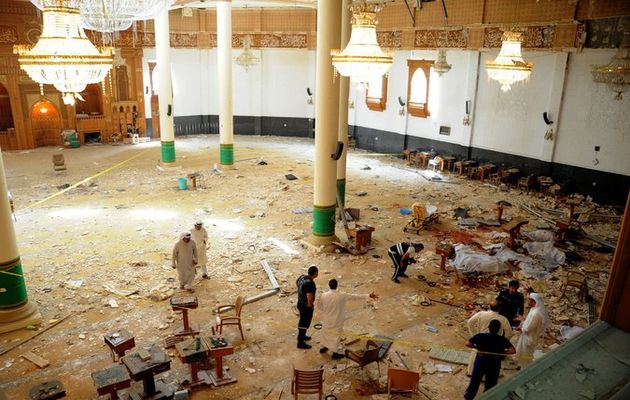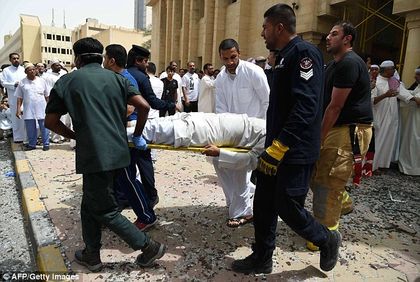A suicide bomber unleashed the first terrorist attack in Kuwait in more than two decades. 202 were wounded.
 The Shia mosque after the attack / Agencies
The Shia mosque after the attack / Agencies
Islamic State has claimed responsibility for a deadly explosion that struck a Shia mosque in the Kuwaiti capital after Friday prayers.
A posting on a Twitter account known to belong to Isis explained the attack was carried out by a suicide bomber wearing an explosive belt. The Isis statement on Twitter said the bomber had targeted a “temple of the apostates”.
The attack was claimed by an Isis affiliate calling itself the Najd Province, the same group that claimed a pair of bombing attacks on Shia mosques in Saudi Arabia in recent weeks.
Sunni-ruled Kuwait has a large Shia minority, which ISIS considers to be heretical, and refers to them derogatively as “rafideen” or “rejectionists. This is the first attack on a Shia mosque to take place in the small Gulf state.
Friday’s explosion struck the Imam Sadiq mosque in the neighbourhood of al-Sawabir, a residential and shopping district of Kuwait City. Kuwait’s interior ministry said at least 25 people had died and another 202 people were wounded.
“A COWARDLY ACTION”
The Kuwaiti justice, religious endowment and Islamic affairs minister, Yacoub al-Sanna, described the attack as a “terrorist and cowardly action which threatens our nation and works at tearing apart the national unity”.
Al-Sanna told the official state agency Kuna that the government would take all necessary measures to ensure protection of houses of worship. “Kuwait was, and will remain, the oasis of security and safety to all components of the Kuwaiti society and sects,” he said.
 25 wewre killed and 202 wounded
25 wewre killed and 202 woundedKuwaiti Prime Minister Sheikh Jaber al-Mubarak al-Sabah commented that the attack was an attempt to threaten national unity. "But this is too difficult for them and we are much stronger than that," he added.
Police formed a cordon around the mosque’s complex immediately after the explosion, banning people from entering or gathering near the area. Ambulances could be seen ferrying the wounded from the site.
“We couldn’t see anything, so we went straight to the wounded and tried to carry them out. We left the dead,” said a witness, Hassan al-Haddad, 21, who said he saw several bodies.
Abdullah al-Saffar, who was at the mosque, said the explosion took place just after midday Friday prayers, which are typically the most crowded of the week. Attendance also increases during the holy Muslim month of Ramadan, which started last week.
A spokesman for Islamic State this week urged the militant group's followers to step up attacks during the Islamic month of Ramadan.

Las opiniones vertidas por nuestros colaboradores se realizan a nivel personal, pudiendo coincidir o no con la postura de la dirección de Protestante Digital.
Si quieres comentar o